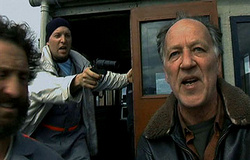With Bride of Culture Snob out-of-town for a two-week class, River Cities’ Reader movie critic Mike Schulz and Culture Snob drank many beers and talked about Incident at Loch Ness. I had seen the movie a few weeks earlier, while Mike hadn’t seen it all.
Click to download the audio commentary (mp3 format, roughly 21 megabytes, 94 minutes), which is intended to be listened to while watching the movie.
Incident at Loch Ness
 Werner Herzog once ate his shoe, so why wouldn’t he chase the Loch Ness monster?
Werner Herzog once ate his shoe, so why wouldn’t he chase the Loch Ness monster?
What’s a little harder to swallow is that the famously idiosyncratic German director – who pulled a boat over a mountain for 1982’s Fitzcarraldo – would team up with Zak Penn, a Hollywood hack who has written such gems as PCU, Inspector Gadget, and Elektra. Yet that’s what happens in Incident at Loch Ness, a 2004 movie that documents their collaboration.
The pairing makes sense in a way. Herzog typically raises the money himself for his decidedly noncommercial projects, but Penn came to him with the financing already secured. Why wouldn’t he jump on board, considering that the Loch Ness monster interested him? It was, in retrospect, a lapse in judgment – but an understandable one.
As expected, Penn and Herzog are working at cross-purposes here – Penn wants to fake some monster sightings, while Herzog aims to understand mass delusion and its causes. The tension between them starts almost immediately, when it becomes clear at a dinner party that Penn hasn’t told Herzog what he has in mind.
Incident at Loch Ness is a fake documentary, but unlike forebears such as This Is Spinal Tap, the conceit actually serves a purpose here. This is a fake documentary about a fake documentary, and it addresses fascinating questions about truth in film. It embodies the contradiction eloquently expressed by director Michael Haneke:
“I always say that film is 24 lies per second at the service of truth or at the service of the attempt to find the truth.”
Incident at Loch Ness is fundamentally a nimble, sometimes silly comedy, yet it also offers nuanced insight into important intellectual questions. Best of all, it never loses its playfulness.
Rigorous yet light, the movie – directed by Penn and written by Penn and Herzog – generates immediate credibility with the dinner party at Herzog’s house. The guests include Ricky Jay, Jeff Goldblum, Crispin Glover, and the crew members of the documentary Herzog and Penn are making – all seasoned film veterans with impressive credits. (Sound guy Russell Williams has a pair of Oscars.)
Most real of all is Herzog, a man whose résumé suggests a deeply serious interior life. That persona is reflected in his sober straight-man character here, but the movie’s conception reveals a game spirit and self-deprecating sense of humor.
I don’t think Penn expects people to buy the movie as a real documentary, particularly considering the ways he frequently pops the bubble with ridiculousness. Penn and cryptozoologist Michael Karnow, in particular, appear to be refugees from a Christopher Guest mockumentary, with the performance rhythms of comedians rather than naturalistic performers. And then there’s Penn’s decision to hire a buxom Playboy model as his sonar operator … .
These shifts in tone – repeatedly crossing the line between things that feel real and things that don’t – are somewhat perplexing, and it would be easy to look at Penn’s résumé and conclude that he’s simply not skilled enough as a filmmaker to pull off this sort of movie.
Yet I think they’re effective in engaging the viewer. As with the movies of Errol Morris, the director continually casts doubt on his purpose, and the audience is forced to pay closer attention than it is typically accustomed.
But what sort of audience is there for a movie such as this, so clearly aimed at film dorks? Incident at Loch Ness has, to borrow from Spinal Tap, a very selective appeal. People who’ve never heard of Werner Herzog – or who only recognize the name because of his acclaimed 2005 documentary Grizzly Man – will likely find this movie inscrutable. It has a singularity because it’s drawn from the life, work, and even the mythology of Herzog, particularly his stormy relationship with the actor Klaus Kinski. A familiarity with his oeuvre isn’t necessarily required, but it provides context and meaning.
Without that background, I can’t imagine that somebody could appreciate many of the movie’s inside jokes, including its best one: Only a deeply pretentious filmmaker would be disappointed (as Herzog is here) about capturing genuine footage of the Loch Ness monster because it’s too fantastic – it’s not nearly mundane enough to speak to the human condition.

